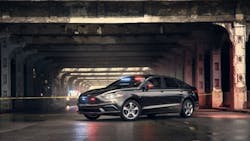Ford Unveils First Plug-In Hybrid Police Vehicle
By Phoebe Wall Howard
Source Detroit Free Press
DETROIT -- Ford will build the nation’s first plug-in hybrid police vehicle in the summer of 2018, the company announced Monday.
A different, hybrid police vehicle unveiled early this year came in response to a growing demand for greener police options.
This latest introduction of a 2019 Special Service Plug-In Hybrid Sedan — designed for non-pursuit roles such fire chiefs, police chiefs and detectives — drives up to 21 miles on batteries alone, after which a 2.0-liter 4-cylinder engine takes over.
But for most of its intended use, the batteries will be sufficient.
“The plug-in moves us to zero fuel use for operation,” said Stephen Tyler, police brand marketing manager for Ford. “As constituents put pressure on cities to become greener, we see these solutions.”
Plug-in hybrids have a larger battery and can travel farther on electric power than conventional hybrids, which rely on their gasoline engines for nearly all driving.
“This is the first Ford police vehicle that could use no gasoline during a shift,” Tyler said. “Anyone can plug this in to any wall outlet to run gas- and emissions-free on battery-only operation.”
Ford has seen its hybrid pursuit-rated cars, introduced earlier this year, embraced from New York to California.
In 2016 alone, the law enforcement market consisted of about 56,000 vehicles. Auto companies like selling vehicles to law enforcement, not only because it generates revenue and raises the brand profile, but police vehicles don’t flood used-car auctions.
Ford has seen steady growth in police vehicle sales and market share. In 2013, Ford had 42% of the market when it began selling the new Interceptor police vehicles, a Taurus-based sedan and an Explorer-based SUV. In 2014, it jumped to 51%. In 2015, it climbed to 56%. In 2016, that grew to 63% of the 56,000-vehicle market.
When it comes to the new hybrid and plug-in hybrid vehicles, it appears buyers were ready even before Ford. New York City purchased about 1,800 hybrid Ford Fusion vehicles and assigned roughly 1,200 to the New York Police Department, Tyler said.
A year ago, the city of Philadelphia purchased 17 plug-in hybrids for the sanitation department and police community relations, with plans to install charging stations.
“This really is just the beginning of the city’s expansion of our hybrid fleet,” Rebecca Rhynhard, Philadelphia's chief administration officer told the Philly Voice.
Police often burn fuel when their traditional vehicles are idling. In a battery-fueled hybrid, an engine isn’t running when idling. So that’s potentially millions of dollars in savings on thousands of police vehicles nationwide.
A gasoline-electric hybrid has both a gas engine and a battery-powered electric motor, both of which are automatically engaged, and there's no need for charging.
A plug-in hybrid has a much larger battery and can propel the vehicle without gas for many miles at a time, and the car can be recharged by plugging it into a wall outlet, saving on trips to the gas station.
Agencies will be able to re-charge the battery in 2.5 hours on a 240-volt, or Level 2 charger. Ford emphasizes that most agencies won’t need anything more than a “regular” 120-volt wall outlet to recharge the battery, though it’ll take longer.
The 2019 plug-in hybrid will be built at Ford’s facility in Hermosillo, Mexico, where the Ford Fusion is assembled. Then the police vehicle goes to Chicago to be modified for police use.
Police options include a driver spot lamp, trunk storage vault, rear-door control disabling and a “Dark Car” feature that modifies lighting for surveillance.
The plug-in police car joins two other new Ford police vehicles revealed this year, the Ford Police Responder Hybrid Sedan and the F-150 Police Responder.
Both of these vehicles confirmed their pursuit rating after completing tests by the Michigan State Police at Grattan Raceway in Belding, Mich., and Los Angeles County Sheriff’s Department at Auto Club Speedway in Fontana, Calif.
Ford is repairing Interceptor Explorer police vehicles to correct possible carbon monoxide leaks that may be tied to after-market installation of police equipment.
The company immediately assigned teams to investigate the issue and determined modifications to the vehicles after purchase had been done improperly, Tyler said this week. Data on number of police cars returned for service was not available.
“You’re talking about police being in their cars all day long," Tyler said. "They’re out there putting their lives on the line. We don’t need the car to be a threat. Safety is our top priority.”
___ (c)2017 the Detroit Free Press Visit the Detroit Free Press at www.freep.com Distributed by Tribune Content Agency, LLC.



